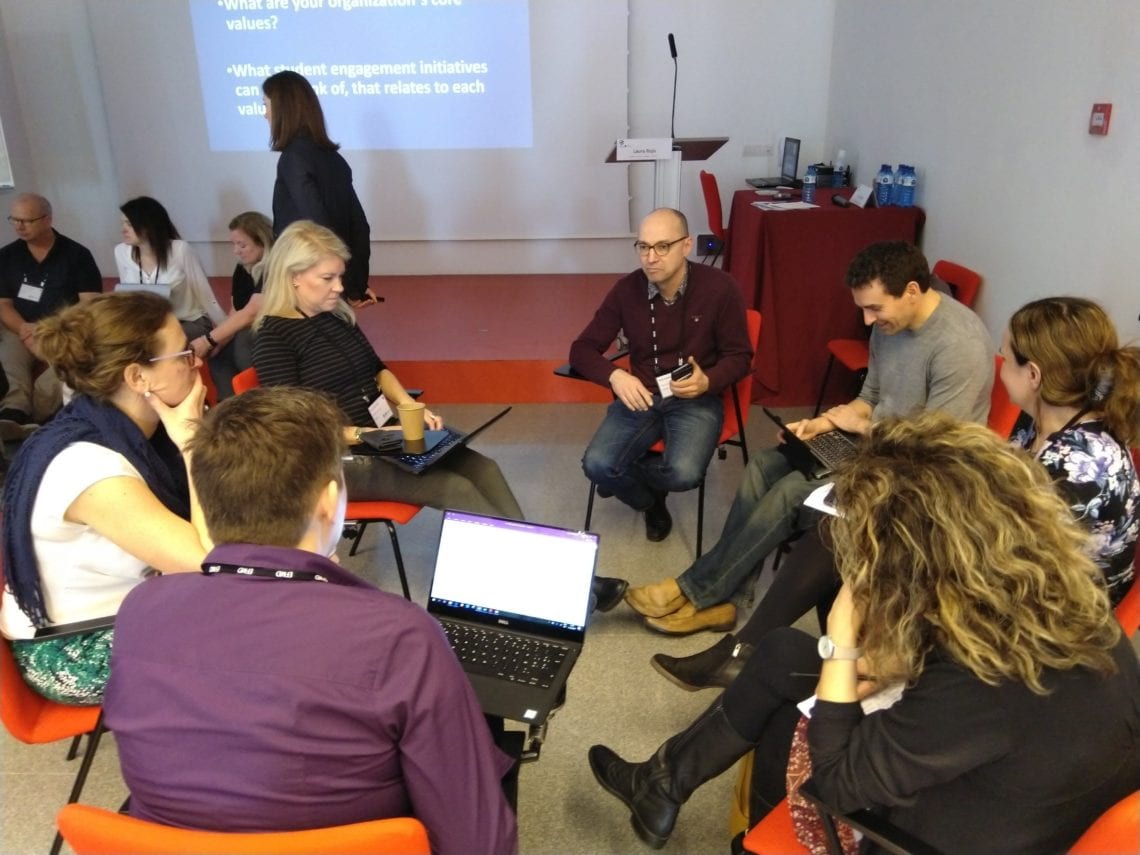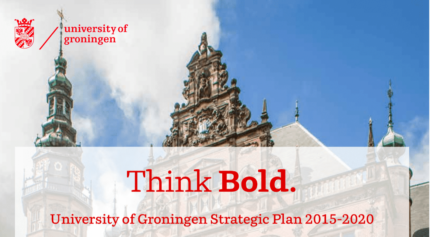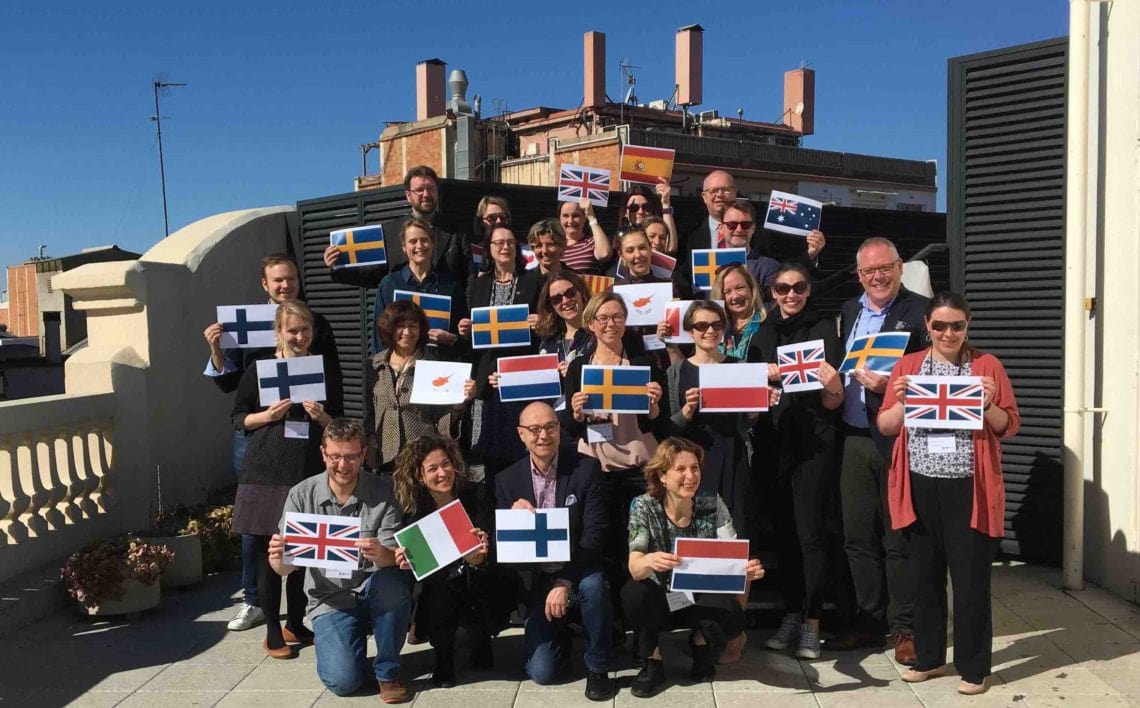It really does feel as there has never been a more important time to develop, maintain and grow links between UK universities and those in the rest of Europe.
Some British universities have also been looking to establish presences on the continent too – such as Oxford and Warwick noted in this piece from a while back and most recently Lancaster in Leipzig.
There is also a number of HE networks such as the European Universities Association (EUA), the European Consortium of Innovative Universities (ECIU), League of European Research Universities (LERU) and the European Association of Institutions in Higher Education (EURASHE) which are attracting new interest from UK universities.
Never gonna let EU down
One more of those networks is HUMANE, Heads of University Management and Administration Network in Europe. This network of has been going for over 20 years now, and was intended to bring university administrative leaders from across Europe together to promote professional development and share best practice.
There are over 170 HUMANE members in 26 different European countries and is headed by Esa Hämäläinen, Director of Administration at the University of Helsinki. Given the current Brexit crisis the UK is inflicting on itself, it seems to me that finding whatever ways we can in higher education to maintain connections with other European institutions is absolutely essential, and HUMANE offers one really valuable means of achieving this. Membership of HUMANE provides opportunities to:
- expand professional networks both locally and internationally,
- continually develop the skills and expertise that senior staff need to succeed,
- stay up-to-date on key issues and trends,
- have the opportunity to work with HE leaders who have first-hand experience of the ever-changing challenges within HE.

Once again this year, I was really pleased to be invited to participate in the annual HUMANE Winter School. This is a week-long intensive training course for up and coming senior professional services staff. Since its beginning in 2003, it has become one of the best programmes around for developing the leadership potential of outstanding administrators. Most importantly though it brings together 40 administrators from all over Europe (and beyond) with participants this year from the UK, Finland, Sweden, the Netherlands, France, Poland, Germany, Spain, Canada, Italy, and Australia.
Never gonna make EU cry
The Winter School is one of the signature events in the HUMANE calendar and is intended to develop the leadership potential of talented senior managers by making them fully aware of the concepts and practices of strategic management in a European context, and the importance of integrating academic matters, finances, human resources, governance, leadership and communication strategy in the development and articulation of university strategy.
The Winter School focuses on leadership and management skills in the context of the “big picture” of global higher education. The programme is equally sensitive to the uniqueness of the practice of management in a university setting. This is not just “yet another” management course.
Participants will gain experience in making informed choices in decision-making processes.The Winter School uses the experience of HUMANE and EFMD members to give unique first-hand insight into general problems. The geographical and cultural spread of our members ensure that this discussion is not system-specific.
The core themes of the Winter School Programme are broad and international:
-
- Global sector trends and the implications of globalisation for higher education institutions
- Governance, leadership and management models in higher education
- Talent management
- Financial Management
- Strategic and Change Management
- Human Resource Management
- Communication Strategy
- Globalisation


The programme is highly intensive, and includes plenary sessions and practical work in small groups based on international case studies. One of the case studies, in the last four years, has been the internationalisation strategies of the University of Nottingham. The other case this year, for the first time, was Groningen University and its emerging internationalisation strategy following its withdrawal from a campus development in China. The contrasts and similarities between the cases were also fascinating for all of those involved and it was particularly interesting to hear about the governmental, political and governance issues faced at Groningen from Stephan van Galen, the Secretary General at the University.
I’ve enjoyed discussing and engaging with delegates on this and talking about the challenges and benefits of international strategy and operations. It’s always good to to see how the participants engage with the material, working incredibly hard in teams to respond to one of the two case studies and then present to another team who play different roles as part of a University Executive Board. Their case study submissions and presentations are assessed by a selection of senior leaders, including former Winter School participants, and feedback on these is then provided in front of the whole group.
The work is of a consistently high standard as you might expect from this kind of group and the insights provided are always interesting. The intensity and dedication of the case study groups and the intelligent analysis, commentary and response to the data they invariably deliver is a pleasure to witness.
Perhaps unsurprisingly, given the proximity of the event to the original Brexit day, there was much emphasis in the case responses to the need for both universities to broaden and deepen their European partnerships and collaborative activities (and potentially even establishing new campuses).
Never gonna run around and desert EU
Many of those who have participated in the Winter School over the years have progressed to senior leadership positions in European universities and continue to engage in the programme. There is also a thriving alumni network too which brings together everyone who has completed the annual Winter School and other key HUMANE events now has around 500 members from several hundred universities in 25 different countries.
The Network aims to encourage the further development of international networks of professional staff so that they may continue to exchange ideas and experiences as well as enabling members to continue to develop their careers in university leadership and management by deepening their understanding of other universities across Europe and further afield. It’s a really impressive group.
HUMANE and the Winter School are key components in sustaining a European outlook for UK universities in these turbulent Brexity times and I would strongly encourage those who aren’t yet involved to join in and take advantage of the outstanding network and development opportunities HUMANE has to offer.













